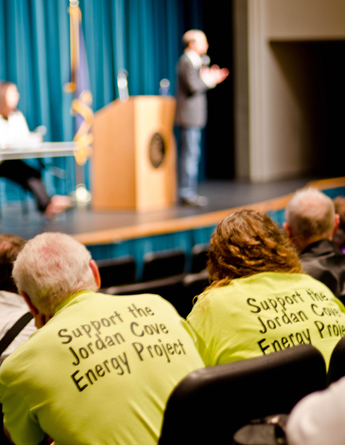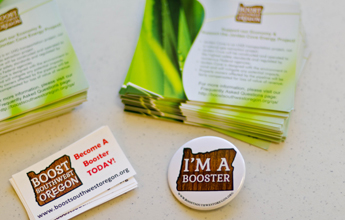Oregon Natural Gas Project Winning Support
December 19, 2013
 |
| Supporters of the Jordan Cove Energy project in Coos Bay, Ore., including more than two dozen members of the IBEW packed a town hall meeting hosted by Sen. Ron Wyden Nov. 25. (photo courtesy: Alisa Mussone) |
The fate of a proposed $7.7 billion liquefied natural gas export facility in Oregon will likely be decided in the next few weeks and members of the IBEW are lobbying for the project’s approval.
The Jordan Cove Energy Project in Coos Bay, Ore., will process, liquefy and transfer natural gas to cargo ships for export around the world, primarily to Asia. Owners Veresen would also build a 420 megawatt natural-gas-fueled power plant and a 234-mile pipeline to support the liquefaction plant. It would be the first export facility on the West Coast and, of the 24 export plants that have applied for federal approval, only the second with a project labor agreement in place. If approved, construction would employ an average of 930 union members for almost four years, with a peak workforce of 2,100.
“The economy here on the south coast is pretty bad and has been since the timber industry shut down in the ‘90s,” said Coos Bay Local 932 Business Manager Bob Westerman. “Not only would it mean full employment for years on this project but the infrastructure improvements –more power, better rail and port infrastructure—would be the cornerstone of an industrial rebirth that would keep us working and growing for a long time.”
Before construction can begin, however, the Department of Energy must issue a permit to sell gas in countries without a free trade agreement with the U.S. That includes Japan, Indonesia and India, the facility’s most likely customers.
Only four permits have been issued by the energy department since the fracking boom made exporting natural gas a possible. Three licenses were given to plants on the Gulf Coast. The fourth was recently awarded to a facility in Maryland.
Jordan Cove’s application is scheduled for consideration by the energy department by the end of January, but there is growing concern that after four years and nearly $130 million in planning and review costs, it might not get that chance.
Environmentalists concerned about air quality and greenhouse gas have recently been joined by an unlikely ally: domestic manufacturing companies concerned that exporting gas will drive up prices at home and kill the recent growth in U.S. manufacturing. Company officials from Dow Chemicals, among others, are calling for a “pause” in new export licenses.
 |
| Boost Southwest Oregon, a coalition of labor and businesses, has been at the center of the campaign to get the $7.7 billion natural gas export facility built |
Project supporters are growing concerned that the call for a blanket ban might ensnare the project. Westerman has been working closely with IBEW lobbyists and Boost Southwest Oregon, a coalition of trade unions and businesses, on a campaign to build support for Jordan Cove and, at least let the proponents of Jordan Cove make their case.
In recent days that campaign has focused on primarily on the senior senator from Oregon, Democrat Ron Wyden, the chairman of the Senate Natural Resources Committee, which oversees the Department of Energy.
Wyden has taken no definitive position on the project, but in the last year he has, at times, endorsed the idea of a pause.
When Sen. Wyden hosted a town hall meeting Nov. 25 at Southwest Oregon Community College in Coos Bay, more than two-dozen IBEW members joined nearly 300 supporters of the project. Westerman said they outnumbered the opposition opponents nearly six to one.
“We wanted him to see this community is strongly in support of this project,” Westerman said. “Every trade showed up from across the state. The energy in there, it was awesome.”
Wyden did not commit his support for the project, but he gave his strongest statement to date.
“I want it understood in this community that, in my efforts as chair of the Senate Natural Resources Committee, I believe I have now made it possible for Jordan Cove to get full consideration as a facility for export,” Wyden said.
That statement was met with a nearly 30-second standing ovation from project supporters.
“We just want the chance to make our case why this is good for southwest Oregon and good for the country,” Westerman said. “If we get that chance, I think we have a good shot.”
|